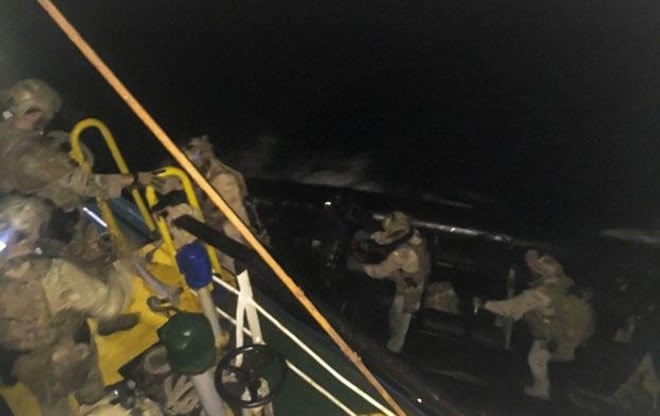

|
|
||||||
 Interview: Somali coastline still vulnerable to piracy despite a five year lull: expert
The retired British army officer said the international community should prioritize re-training of Somalia coast guard alongside investments in youth empowerment projects to reduce piracy.
The expansive Somali coastline that is a critical shipping route remains prone to pirate attacks despite a five year lull occasioned by enhanced patrols by international naval forces, an expert has said.  "At the height of piracy in 2012, ships coming to high risk areas took deterrent measures like having armed guards and sailing at high speed in deep waters. Time passed and companies abandoned those measures and pirates found an opportunity to strike," said Steed.
He noted that reduced presence of international naval forces in Somali coast alongside scaling of security budget by shipping companies may have fueled latest pirate attacks. "We had six pirate attacks this year and most of them were on commercial dhows. With war in Somalia and Yemen, it makes this crucial shipping line a potential target for pirates," Steed said. He regretted that well heeled individuals who have profited from piracy are luring jobless Somalia youth into the criminal enterprise that promise them new sources of income. There is ample evidence that pirates are regrouping to stage more attacks on commercial vessels sailing through Somali coastline. "Pirates have been doing other criminal activities like weapons smuggling and people trafficking. We think they have regrouped and are now more organized," Steed told Xinhua. His organization has been advising shipping companies to invest in armed guards and avoid sailing along the shores where pirates stage attacks. At the same time, Steed refuted claims that illegal fishing had fuelled piracy in Somali waters. The retired British army officer said the international community should prioritize re-training of Somalia coast guard alongside investments in youth empowerment projects to reduce piracy. "Offering alternative livelihoods to unemployed youth is crucial to end piracy. There is need to develop Somalia's naval capability in order to end this menace," Steed said. He lauded China's involvement in anti-piracy activities along Somalia waters against a backdrop of reduced presence of western naval forces. He added that the presence of Chinese warships in Somalia coastline has bolstered efforts to prevent attack on commercial vessels by criminal gangs. John Steed, the Regional Manager of Horn of Africa at Oceans Beyond Piracy told Xinhua in a recent interview that commercial vessels transiting through Somali waters could be targeted by pirates unless vigilance is enhanced. "The threat of return of piracy in Somalia coastline is real if the international community does not wake up. The big commercial ships can still be hijacked by pirates," Steed said in Nairobi. He spoke against a backdrop of a series of pirate attacks on commercial vessels off the coast of Somalia in the last two months. Steed blamed lax policing, high youth unemployment alongside break down of law and order for the resurgence of piracy in Somalia waters. Leave a comment |
|
|||||
| Nagala soo xiriir: [email protected] |
| Copyright © 2009 - 2026 Somalilanders.com All Rights Reserved. |
Interview: Somali coastline still vulnerable to piracy despite a five year lull: expert
The retired British army officer said the international community should prioritize re-training of Somalia coast guard alongside investments in youth empowerment projects to reduce piracy.